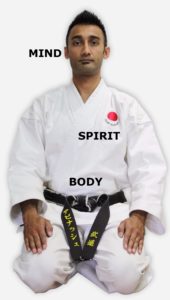Shu Ha Ri is something I was introduced to a few years ago and at first it seemed a bit of a stretch for me to apply it in a fighting adaption or the idea of learning something totally new. Fast forward to today and I find that the distinctions of the levels are useful guides (not black and white rules) to help influence how to approach learning any new skill especially in Karate.
What is Shu Ha Ri?
Shuhari (守破離) roughly translates to "to keep, to fall, to break away". Shu Ha Ri is used to describe the progression of training or learning. It is a Japanese martial art concept that is used to describe the stages of learning to mastery. In recent years, it has been abstracted and applied to the cycle of learning in general.
| Japanese | Kanji | Meaning |
|---|---|---|
| shu | 守 | "protect", "obey" – traditional wisdom – learning fundamentals, techniques, heuristics, proverbs |
| ha | 破 | "detach", "digress" – breaking with tradition – detachment from the illusions of self |
| ri | 離 | "leave", "separate"– transcendence – there are no techniques or proverbs, all moves are natural, becoming one with spirit alone without clinging to forms; transcending the physical |
Aikido master teacher Endō Seishirō summaries as follows:
“It is known that, when we learn or train in something, we pass through the stages of shu, ha, and ri. These stages are explained as follows. In shu, we repeat the forms and discipline ourselves so that our bodies absorb the forms that our forbearers created. We remain faithful to the forms with no deviation. Next, in the stage of ha, once we have disciplined ourselves to acquire the forms and movements, we make innovations. In this process the forms may be broken and discarded. Finally, in ri, we completely depart from the forms, open the door to creative technique, and arrive in a place where we act in accordance with what our heart/mind desires, unhindered while not overstepping laws."

Endō Seishirō born 1942, is an 8th dan ranked Aikikai aikido master teacher.
In the contents relevant to self-discovery and mastery, I would define Shu Ha Ri as:
Shu – In this beginning stage the student follows the teachings of one master precisely. He concentrates on how to do the task, without worrying too much about the underlying theory. If there are multiple variations on how to do the task, he concentrates on just the one way his master teaches him.
Ha – At this point the student begins to branch out. With the basic practices working he now starts to learn the underlying principles and theory behind the technique. He also starts learning from other masters and integrates that learning into his practice.
Ri – Now the student isn’t learning from other people, but from his own practice. He creates his own approaches and adapts what he’s learned to his own particular circumstances.

Everyone is on his or her individual journey and time will vary, some practices and approach can take a lifetime.

